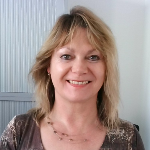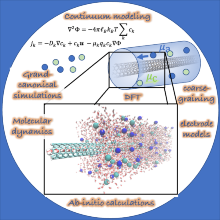This group has moved to the Technical University of Hamburg
Liquids at interfaces and especially in strong confinement show behavior that differs significantly from their counterparts in bulk. These effects are commonly exploited e.g. in porous materials for industrial processes such as purification, catalysis or energy storage, yet a detailed understanding of the microscopic details is often only emerging owing to intrinsic the multiscale nature. More in detail, at any (semi-) conducting surface, the movements of electrons and holes can strongly couple to the dynamics of ions in the electrical double layer, leading to new emerging phenomena in ionotronics such as memristors or electrolyte-gated transistors. The challenge here is to bridge the different length-scales involved, ranging from interfacial effects where quantum effects need to be considered to applications such as microfluidic setups or catalysis in hierarchical materials.
We employ various computer simulation methods to gain microscopic ranging from density functional theory to classical molecular simulations and employ different coarse-graining approaches in order to bridge the gaps to effective continuum approaches which include all microscopic details. Of major interest for applications are electrostatic interactions which in such systems become tensorial and anisotropic as well as the impact of interfaces and confinement on transport properties. We combine insights from molecular simulations with data-driven accompanied with rigorous statistical mechanics approaches
Feel free to contact us if you are interested in joining our group as a student or researcher, or in collaborating on common interests!
News from the Multiscale Matrials Modeling group
February 2024
November 2023
June 2024
April 2024
May 2023
July 2022
April 2021
January 2021

Alexander Schlaich
Dr.Multiscale Materials Modeling

Sabine Raaf
Administration



